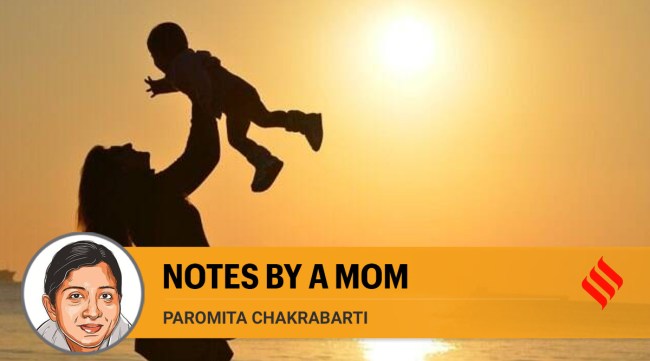Opinion Twinkle Khanna is right — motherhood is tough, and we’re all just trying our best
Be it tiger moms, helicopter moms, panda moms or those in between, we only hope for our children to be better people than we are
 Good or not, struggling mothers are often the best at laughing at themselves, sometimes, at starting afresh. Even if their child ends up in therapy, they’ll admit that much. (Representational/Pixabay)
Good or not, struggling mothers are often the best at laughing at themselves, sometimes, at starting afresh. Even if their child ends up in therapy, they’ll admit that much. (Representational/Pixabay) In the first flush of my pregnancy, buoyed by obsessive readings of the What to Expect series and Adele Faber and Elaine Mazlish’s How to Talk So Kids Will Listen & Listen So Kids Will Talk, I remember telling a former colleague, a mother of two, my plans for raising the child-to-come: No raised voices, no punishments, only gentle admonitions to convey my disappointment, should the need arise.
In hindsight, I imagine her to have choked inwardly on her coffee as she tried to keep the chortle down. But being the kind soul that she is, she kept a straight face and wished me well.
It didn’t take long for my out-of-sync imagination to crash-land. In the sleep-deprived months of the first year, trying to lull a colicky baby to rest, the first seed of doubt reared its head: No one had ever said things would be this way. Is it only me who’s incompetent then? And does it get better?
It does, and no, it’s not us. Here’s the thing about parenting that no one lets on while building up motherhood as a badge of honour: it’s a bl***y tough job. Tons of advice, limited infrastructural support (especially for the mother) and a gig where no two days are the same, parenting is the adventure sport you had no idea you were capable of when you signed up blind. And if you are the mother, good luck and a big hug to you, because you’ll need it for all the times you feel like the only thing you have become adept at is apologising — to your family (“I have to be there for this meeting, I am sorry”), at the daycare/school (“Sorry, I got late”), at the workplace (“I have to attend the PTM, sorry”) and to your child as he grows up (“Sorry, mamma got this wrong. She’ll try again tomorrow”) — since nothing else seems to fall in place.
The “good” dad who participates equally in the parenting process, ferrying the children from summer camp to birthday parties to sports sessions, who takes an active interest in their academics and their friends, is a phenomenon that’s still catching on. And, as luck (or societal construct would have it), the onus on them is far less. But the school for good mothers has long been around, with a toxic insistence on pinning the outcomes of parenting solely on the mother — which is probably why actor Twinkle Khanna’s recent social media post on mothering strikes a chord. On Instagram, Khanna wrote, “It doesn’t matter what you do. When they grow up, they will go to therapy and blame you:) All we can do is hope is that they realise that there are very few truly terrible mothers (sic). Even the mother from Home Alone – who forgot about her child not once, but also in the sequel – was not evil, just overwhelmed. Mothers are far from perfect, but most of us try to do our best, even on our worst days. Agree? Disagree?”
If you have heard the terms helicopter mom, tiger mom or panda mom, you’ll know that the models of modern parenting are built to a comparative scale — there’s the aspirational Instagram family with children who score perfect grades, who have taken their A-levels at piano, while their parents peak yet another professional milestone. There are those at the other end of the spectrum who can make chaos look inviting, homeschooling their children, baking organic treats, turning up their noses at the competitive cycle and living off-the-grid. And then there are those like me trying to find a middle ground, forever racked by doubt and guilt, dithering irresolutely between the tendency to hover and micromanage and the urge to leave them well alone to blunder through and find their way. The only things we are good at are running our lives on tight schedules and multitasking. Otherwise, we are the messiest of moms out there because we don’t know who we want to be, tentatively picking our way through our own shortcomings and our hopes for making our children better than the people we are.
After a birthday party last week, a friend comes up and says her son thinks I am the coolest aunt in the group: “He says you never raise your voice and the get-togethers at your place are the most fun.” I feel a flutter of pride and smile modestly, the morning’s shouting match across the breakfast table over a room worse than a pigsty already receding in my mind. That’s also when I catch my son’s eye. He looks mildly amused. In the car, he sighs with exaggeration and says he wishes his friends could spend a week in his shoes. They’d know his mom is nowhere near as with it as they imagine her to be. As for being quiet, he rolls his eyes with such passion, I am afraid they’ll fall off. We laugh.
Good or not, struggling mothers are often the best at laughing at themselves, sometimes, at starting afresh. Even if their child ends up in therapy, they’ll admit that much.
paromita.chakrabarti@expressindia.com





